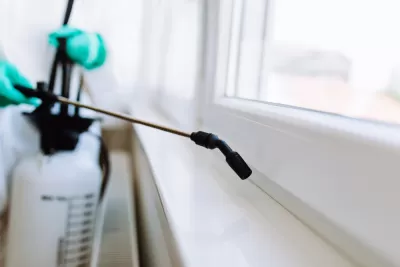For children who have asthma, pests like cockroaches and mice can trigger allergic reactions and lead to recurring and expensive hospital visits. Could insurers save money by investing in housing-based improvements like pest management services?

There’s a connection between one’s home environment and asthma. An array of home-related factors can trigger or worsen asthma: pests such as cockroaches and mice can cause allergic reactions, and secondhand smoke, air pollution, and mold can make it worse. In New York City, children with asthma who are exposed to pests are three times more likely to be hospitalized, and they account for more than two-thirds of asthma-related rehospitalizations annually, according to the city’s Department of Health and Mental Hygiene (DOHMH).
The department recently launched a pilot project to zero in on pest-related pediatric asthma by delivering comprehensive pest management to patients’ homes—and tapping a group of Medicaid health insurers to fund it, even though such nonmedical interventions aren’t typically covered. If the three-year Medicaid Together Improving Asthma Program pilot succeeds in reducing repeat hospitalizations, the insurers should reap returns in the form of direct health care cost savings—but if not, a $1.2 million fund is in place to mitigate any losses.
“The environment in which a person lives directly affects their health,” says DOHMH project manager Beatrice Mauger, launch lead for Medicaid Together. “Our hope is to have a win-win for the health care sector and their clients. That can be achieved if this model shows the health care sector that investing in housing-based improvements can generate sustainable financial benefits.”
Over the years, other programs have worked more generally to tackle home health hazards that could exacerbate asthma, such as the U.S. Department of Housing and Urban Development’s Healthy Homes Program and the National Institute of Food and Agriculture’s Healthy Homes Partnership. At Boston Medical Center...
FULL STORY: Getting Medicaid to Pay for Pest Control

Planetizen Federal Action Tracker
A weekly monitor of how Trump’s orders and actions are impacting planners and planning in America.

Congressman Proposes Bill to Rename DC Metro “Trump Train”
The Make Autorail Great Again Act would withhold federal funding to the system until the Washington Metropolitan Area Transit Authority (WMATA), rebrands as the Washington Metropolitan Authority for Greater Access (WMAGA).

DARTSpace Platform Streamlines Dallas TOD Application Process
The Dallas transit agency hopes a shorter permitting timeline will boost transit-oriented development around rail stations.

Renters Now Outnumber Homeowners in Over 200 US Suburbs
High housing costs in city centers and the new-found flexibility offered by remote work are pushing more renters to suburban areas.

The Tiny, Adorable $7,000 Car Turning Japan Onto EVs
The single seat Mibot charges from a regular plug as quickly as an iPad, and is about half the price of an average EV.

Supreme Court Ruling in Pipeline Case Guts Federal Environmental Law
The decision limits the scope of a federal law that mandates extensive environmental impact reviews of energy, infrastructure, and transportation projects.
Urban Design for Planners 1: Software Tools
This six-course series explores essential urban design concepts using open source software and equips planners with the tools they need to participate fully in the urban design process.
Planning for Universal Design
Learn the tools for implementing Universal Design in planning regulations.
Roanoke Valley-Alleghany Regional Commission
City of Mt Shasta
City of Camden Redevelopment Agency
City of Astoria
Transportation Research & Education Center (TREC) at Portland State University
US High Speed Rail Association
City of Camden Redevelopment Agency
Municipality of Princeton (NJ)




























